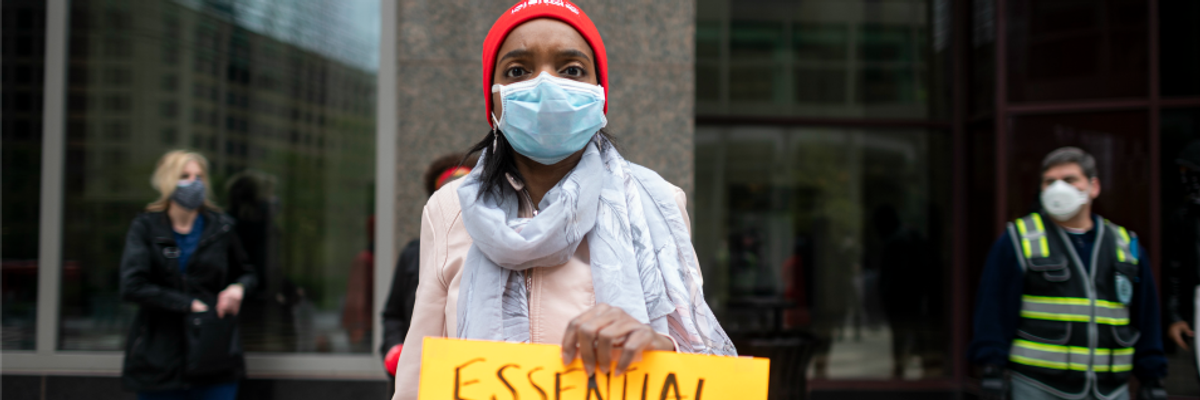
A nurse attends a protest, organized by the New York State Nurses Association (NYSNA) in front of the National Holdings Corporation on May 8, 2020 in New York City. (Photo: Johannes Eisele/AFP via Getty Images)
Jim Cramer: Coronavirus Pandemic Triggered 'One of the Greatest Wealth Transfers in History'
Small businesses are "dropping like flies," said the "Mad Money" host.
CNBC's Jim Cramer said Thursday that that coronavirus pandemic has triggered "one of the greatest wealth transfers in history."
The remark from the network's "Mad Money" host came amid "ominous" economic data but a rebounding stock market.
"How can the market rebound without the economy? Because the market doesn't represent the economy; it represents the future of big business," said Cramer. "The bigger the business, the more it moves the major averages."
"And that matters," he continued, 'because this is the first recession where big business--along of course with bigger wealth, but that's not really by show--is coming through virtually unscathed, if not going for the gold."
In contrast, small businesses are "dropping like flies," Cramer said, attributing those failures to the fact that smaller businesses are struggling to pay rent as "major landlords" don't appear to be offering relief.
"That's the thing about this pandemic," Cramer continued, "it's been one of the greatest wealth transfers in history."
Cramer projected that transfer to have a "horrible effect" on the country.
Further, the CNBC host said, "we've barely begun to see the impacts" of the pandemic's economic fallout. Cramer pointed to the latest corporate bankruptcy figures he said would "chill both Republicans and Democrats."
The new comments came a day before federal data showed the nation facing a 13.3 percent unemployment rate, and as a new analysis showed the fortunes of U.S. billionaires increased by $565 billion between March 18 and June 4. That 11-week period also saw 42.6 million Americans filing jobless claims.
An Urgent Message From Our Co-Founder
Dear Common Dreams reader, The U.S. is on a fast track to authoritarianism like nothing I've ever seen. Meanwhile, corporate news outlets are utterly capitulating to Trump, twisting their coverage to avoid drawing his ire while lining up to stuff cash in his pockets. That's why I believe that Common Dreams is doing the best and most consequential reporting that we've ever done. Our small but mighty team is a progressive reporting powerhouse, covering the news every day that the corporate media never will. Our mission has always been simple: To inform. To inspire. And to ignite change for the common good. Now here's the key piece that I want all our readers to understand: None of this would be possible without your financial support. That's not just some fundraising cliche. It's the absolute and literal truth. We don't accept corporate advertising and never will. We don't have a paywall because we don't think people should be blocked from critical news based on their ability to pay. Everything we do is funded by the donations of readers like you. Will you donate now to help power the nonprofit, independent reporting of Common Dreams? Thank you for being a vital member of our community. Together, we can keep independent journalism alive when it’s needed most. - Craig Brown, Co-founder |
CNBC's Jim Cramer said Thursday that that coronavirus pandemic has triggered "one of the greatest wealth transfers in history."
The remark from the network's "Mad Money" host came amid "ominous" economic data but a rebounding stock market.
"How can the market rebound without the economy? Because the market doesn't represent the economy; it represents the future of big business," said Cramer. "The bigger the business, the more it moves the major averages."
"And that matters," he continued, 'because this is the first recession where big business--along of course with bigger wealth, but that's not really by show--is coming through virtually unscathed, if not going for the gold."
In contrast, small businesses are "dropping like flies," Cramer said, attributing those failures to the fact that smaller businesses are struggling to pay rent as "major landlords" don't appear to be offering relief.
"That's the thing about this pandemic," Cramer continued, "it's been one of the greatest wealth transfers in history."
Cramer projected that transfer to have a "horrible effect" on the country.
Further, the CNBC host said, "we've barely begun to see the impacts" of the pandemic's economic fallout. Cramer pointed to the latest corporate bankruptcy figures he said would "chill both Republicans and Democrats."
The new comments came a day before federal data showed the nation facing a 13.3 percent unemployment rate, and as a new analysis showed the fortunes of U.S. billionaires increased by $565 billion between March 18 and June 4. That 11-week period also saw 42.6 million Americans filing jobless claims.
CNBC's Jim Cramer said Thursday that that coronavirus pandemic has triggered "one of the greatest wealth transfers in history."
The remark from the network's "Mad Money" host came amid "ominous" economic data but a rebounding stock market.
"How can the market rebound without the economy? Because the market doesn't represent the economy; it represents the future of big business," said Cramer. "The bigger the business, the more it moves the major averages."
"And that matters," he continued, 'because this is the first recession where big business--along of course with bigger wealth, but that's not really by show--is coming through virtually unscathed, if not going for the gold."
In contrast, small businesses are "dropping like flies," Cramer said, attributing those failures to the fact that smaller businesses are struggling to pay rent as "major landlords" don't appear to be offering relief.
"That's the thing about this pandemic," Cramer continued, "it's been one of the greatest wealth transfers in history."
Cramer projected that transfer to have a "horrible effect" on the country.
Further, the CNBC host said, "we've barely begun to see the impacts" of the pandemic's economic fallout. Cramer pointed to the latest corporate bankruptcy figures he said would "chill both Republicans and Democrats."
The new comments came a day before federal data showed the nation facing a 13.3 percent unemployment rate, and as a new analysis showed the fortunes of U.S. billionaires increased by $565 billion between March 18 and June 4. That 11-week period also saw 42.6 million Americans filing jobless claims.

